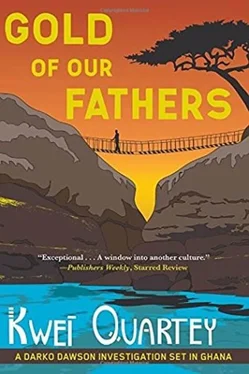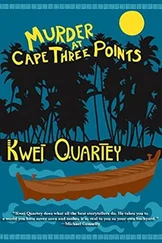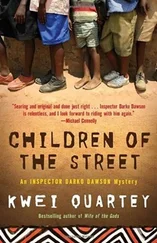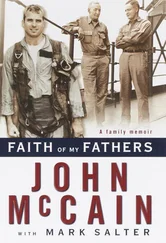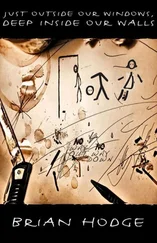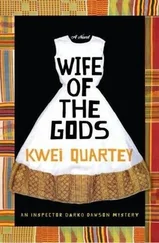Finally, at the crest of a hill, they saw the town ahead of them, and to the left, a segment of the Ofin River along with a large tract of land scoured bare and churned into hills and valleys of grayish-yellow soil.
Kofi looked over for a second and followed Dawson’s gaze, then back to the roadway shaking his head. “These China people,” he said in disgust. “Look what they have done to the land with their excavators.”
Look what we’ve let them do , Dawson thought.
Dunkwa was nothing spectacular by way of buildings or roads, and Dawson had not expected it to be. In most of the lower half of Ghana, certain fairly similar characteristics could be anticipated in towns of a certain size. It was only as one traveled into the arid north that architecture radically changed.
Dawson saw square brick homes with the standard corrugated tin roofs, unpaved streets and houses in random arrangement. Worn away at the sides to a strip in the middle, the main road through town was flanked on the sides by wide trash-strewn gutters, and then by chop bars, small vegetable stands. But then he had to admit that Dunkwa had a little twist to its otherwise unsurprising appearance: gold-buying stores. Lots of them.
“Ofin Gold Trading Company,” Dawson read out from one of the signs.
“Many places here to buy and sell gold,” Kofi said, in Twi this time. He turned off the main road and proceeded slowly through a narrow lane between several small buildings. He pointed. “See the line on the houses? That’s when the town flooded.”
Dawson at first didn’t understand what Kofi meant, but then he saw a faint brown border at the base of each building, the watermark of a notorious flooding of Dunkwa last year when torrents swelled the Ofin River beyond its banks.
“The police station is just here,” Kofi said, making a final left turn and pulling to a stop in front of the small building painted GPS-signature yellow and blue, or sometimes white and blue.
“Wait for me here, Kofi,” Dawson told him. “We will go somewhere else after this.”
“Yes, please.”
Obeng was waiting on the front verandah with a uniformed officer, whom he introduced as Inspector Sackie, a lanky man of about forty with a scar across his top lip.
“Good morning, sir,” he said to Dawson deferentially.
“Morning, Inspector.”
“Please, shall I give you a report first?”
“Let’s not waste precious time. You can tell me on the way there.”
The mining site was farther out than Dawson had expected. As they traveled more and more deeply into the bush along a laterite road whose red dust tarnished the vegetation alongside it, his sense of direction told him they must have been diverging from the course of the Ofin to meet it at some farther point along its course.
“This road,” Inspector Sackie said, “the Chinese built it.”
So they have been good for something , Dawson thought. If they had not constructed it, there might have been no road at all.
But the good roadwork came to an end as Kofi reached a point where a long, deep puddle obliterated the road’s surface. Only a 4x4 could get through that. Dawson and the two other men got out, skirted the border of the puddle to avoid sinking into the muddy thigh-deep water, and continued to their destination on foot.
“What is that noise?” Dawson asked, becoming aware of a monotonous drone in the distance somewhere to their right.
“Excavators,” Sackie said.
As they walked, the noise grew louder, and over a small rise, the source became evident-a vast area below them ploughed up in a fashion similar to what Dawson had just seen close to Dunkwa. To the right, four excavators were clawing up soil from the sides of deep pits and transferring them to the side. His instincts about the Ofin River had been correct. It had reappeared in the distance, making a wide U with the convex side toward them.
Ahead and to the left of more gouged-out pits, Dawson saw a stationary excavator, its claw bucket resting on the ground like an exhausted animal, and not far away from that, a crowd of people was staring at and discussing a deep, wide cavity in the mudbank. Yellow cordon tape had been strung up using the shafts of four shovels, but one of the shovels had toppled over and people had crossed into the would-be restricted area. Presumably that is the crime scene? Where is the body, and where is the constable who has supposedly secured the scene?
Dawson, Obeng, and Sackie half slid, half walked down the muddy incline, and all eyes turned to them.
“What are you doing here?” Sackie demanded of the crowd in Twi.
“Please, the body was here,” a young man volunteered.
“Where is it now?” Dawson asked.
“Please, they have taken it.”
“Taken it where?”
“To the Chinaman’s house.”
Dawson didn’t understand. “What Chinaman’s house? Where?”
A teenager pointed behind them and the men turned.
Now they saw a second gathering of people crowded around a wooded shack behind two mountains of excavated land.
“Is the constable there too?” Dawson asked.
The crowd chorused assent.
“Okay, let’s go and see what’s going on,” Dawson said, bemused. “But Obeng, I need you to clear everybody out of here.”
Dawson and Sackie walked toward the shack, leaving Obeng to secure the area and keep it that way. Dawson wondered why the backup from the Dunkwa station was so poor. Why had only one constable been sent when clearly there needed to be at least two of them? As if reading Dawson’s mind, Sackie said, “Sorry, sir. I wanted to send another officer to assist, but we don’t have enough men.”
Dawson nodded. He wasn’t happy, but he understood the difficulty. It was often the case that the rural police stations were understaffed.
About twenty people milled about the front of the poorly constructed wood structure, which had only a dirty curtain as the door. As Dawson and Sackie approached, a constable in dark blue uniform came out of the shack sweating and looking shaken. Obviously stressed, he yelled at everyone to get away from the door. They backed up but stubbornly stood around to watch. A crowd could be as obstinate and unmoving as an oil tanker in a swamp.
“Morning, sir,” the constable said separately to Sackie and Dawson.
His badge read kobby. He was lean and tall, and very boyish in the face.
Dawson had become aware of a sobbing sound coming from the shack. “What is going on in there?”
“The brother of the Chinese man who died,” Kobby explained with frustration. “When the body was found this morning by the galamsey boys, he told them to help him bring the body here because he didn’t want all those people staring at his brother.”
They moved the body from the crime scene. Dawson’s heart sank. It was a forensic nightmare.
“And then they helped him bring the body here and the brother washed the mud off,” Kobby added.
The blood in Dawson head drained, leaving him cold. He washed the mud off?
“And now he won’t release the body,” Kobby said.
“What do you mean he won’t release the body?” Dawson asked.
“He says he wants to take it back with him to China.”
Eventually, sure , Dawson thought, but not right now . “All right. Let’s go inside.”
The angled wooden slats of the dwelling let some air in, but it was still warm and stifling, and it smelled awful. Dawson could detect decaying flesh, urine, fuel, and stale food. In the middle of the dirt floor, the victim’s brother was weeping and mouthing words in Chinese as he cradled the corpse, shaking it every few seconds as if trying to wake it from sleep.
Читать дальше
